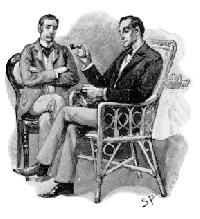Deductive reasoning
From The Art and Popular Culture Encyclopedia
| Revision as of 13:30, 5 October 2007 Jahsonic (Talk | contribs) (Deduction moved to Deductive reasoning,) ← Previous diff |
Current revision Jahsonic (Talk | contribs) |
||
| Line 1: | Line 1: | ||
| + | [[Image:Paget holmes.png|thumb|right|200px|[[Sherlock Holmes]] (right) and Dr. Watson, by [[Sidney Paget]]]] | ||
| {{Template}} | {{Template}} | ||
| + | '''Deductive reasoning''', also '''deductive logic''' or '''logical deduction''' or, informally, '''"[[Top-down and bottom-up design|top-down]]" logic''', is the process of [[reasoning]] from one or more general [[argument (logic)|statement]]s (premises) to reach a logically certain conclusion. | ||
| + | |||
| + | Deductive reasoning links [[premise]]s with [[Consequent|conclusions]]. If all premises are true, the terms are [[unambiguous|clear]], and the rules of deductive [[logic]] are followed, then the conclusion reached is [[logical necessity|necessarily true]]. | ||
| + | |||
| + | Deductive reasoning (top-down logic) contrasts with [[inductive reasoning]] (bottom-up logic) in the following way: In deductive reasoning, a conclusion is reached [[Reductionism|reductively]] by applying general rules that hold over the entirety of a [[Closed-world assumption|closed domain of discourse]], narrowing the range under consideration until only the conclusion is left. In inductive reasoning, the conclusion is reached by generalizing or extrapolating from initial information. As a result, induction can be used even in an [[Open-world assumption|open domain]], one where there is [[Uncertainty|epistemic uncertainty]]. Note, however, that the inductive reasoning mentioned here is not the same as [[mathematical induction|induction]] used in mathematical proofs – [[mathematical induction]] is actually a form of deductive reasoning. | ||
| + | |||
| + | ==Deductive logic== | ||
| + | |||
| + | Deductive reasoning is supported by deductive logic (which is not quite the same thing). | ||
| + | |||
| + | For example: | ||
| + | :All apples are fruit. | ||
| + | :All fruits grow on trees. | ||
| + | :Therefore all apples grow on trees. | ||
| + | |||
| + | Or | ||
| + | |||
| + | :All apples are fruit. | ||
| + | :Some apples are red. | ||
| + | :Therefore some fruit is red. | ||
| + | |||
| + | Intuitively, one might deny the major premise and hence the conclusion; yet anyone accepting the premises accepts the conclusion. | ||
| + | ===Antonyms=== | ||
| + | *[[inductive reasoning]] | ||
| + | |||
| + | ==See also== | ||
| + | :''[[deductive]] [[reasoning]]'' | ||
| + | * [[Argument (logic)]] | ||
| + | * [[Logic]] | ||
| + | * [[Mathematical logic]] | ||
| + | * [[Abductive reasoning]] | ||
| + | * [[Analogy|Analogical reasoning]] | ||
| + | * [[Closed world assumption]] | ||
| + | * [[Correspondence theory of truth]] | ||
| + | * [[Defeasible reasoning]] | ||
| + | * [[Decision making]] | ||
| + | * [[Decision theory]] | ||
| + | * [[Fallacy]] | ||
| + | * [[Fault Tree Analysis]] | ||
| + | * [[Geometry]] | ||
| + | * [[Hypothetico-deductive method]] | ||
| + | * [[Inquiry]] | ||
| + | * [[Mathematical induction]] | ||
| + | * [[Inductive reasoning]] | ||
| + | * [[Inference]] | ||
| + | * [[Logical consequence]] | ||
| + | * [[Natural deduction]] | ||
| + | * [[Propositional calculus]] | ||
| + | * [[Retroductive reasoning]] | ||
| + | * [[Scientific method]] | ||
| + | * [[Soundness]] | ||
| + | * [[Syllogism]] | ||
| {{GFDL}} | {{GFDL}} | ||
Current revision
|
Related e |
|
Featured: |
Deductive reasoning, also deductive logic or logical deduction or, informally, "top-down" logic, is the process of reasoning from one or more general statements (premises) to reach a logically certain conclusion.
Deductive reasoning links premises with conclusions. If all premises are true, the terms are clear, and the rules of deductive logic are followed, then the conclusion reached is necessarily true.
Deductive reasoning (top-down logic) contrasts with inductive reasoning (bottom-up logic) in the following way: In deductive reasoning, a conclusion is reached reductively by applying general rules that hold over the entirety of a closed domain of discourse, narrowing the range under consideration until only the conclusion is left. In inductive reasoning, the conclusion is reached by generalizing or extrapolating from initial information. As a result, induction can be used even in an open domain, one where there is epistemic uncertainty. Note, however, that the inductive reasoning mentioned here is not the same as induction used in mathematical proofs – mathematical induction is actually a form of deductive reasoning.
Deductive logic
Deductive reasoning is supported by deductive logic (which is not quite the same thing).
For example:
- All apples are fruit.
- All fruits grow on trees.
- Therefore all apples grow on trees.
Or
- All apples are fruit.
- Some apples are red.
- Therefore some fruit is red.
Intuitively, one might deny the major premise and hence the conclusion; yet anyone accepting the premises accepts the conclusion.
Antonyms
See also
- Argument (logic)
- Logic
- Mathematical logic
- Abductive reasoning
- Analogical reasoning
- Closed world assumption
- Correspondence theory of truth
- Defeasible reasoning
- Decision making
- Decision theory
- Fallacy
- Fault Tree Analysis
- Geometry
- Hypothetico-deductive method
- Inquiry
- Mathematical induction
- Inductive reasoning
- Inference
- Logical consequence
- Natural deduction
- Propositional calculus
- Retroductive reasoning
- Scientific method
- Soundness
- Syllogism


